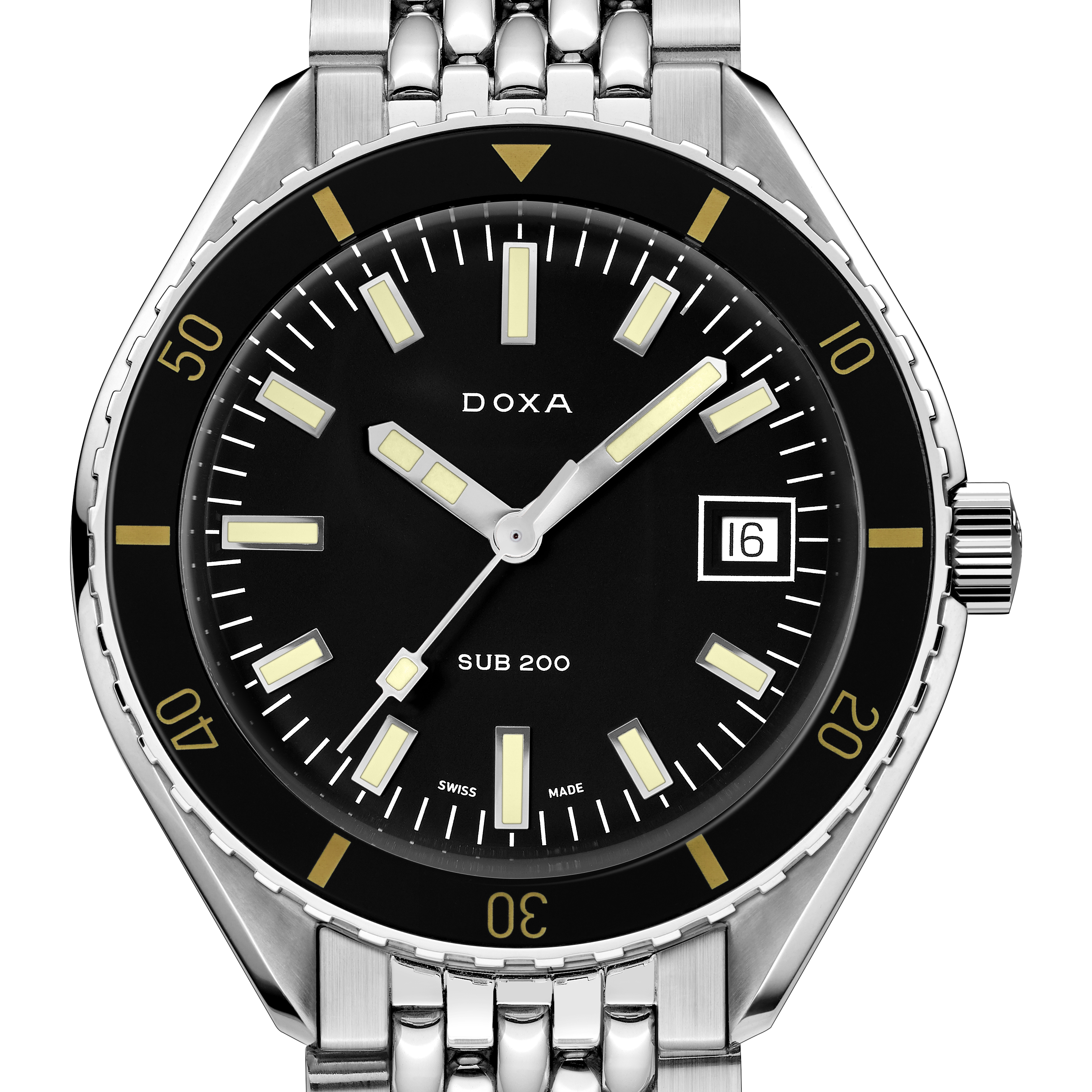
Doxa SUB 200
Power reserve: 42 h, 28800 vph
Lunette tournante unidirectionelle
On the occasion of Baselworld 2019, DOXA presents a new edition of the DOXA SUB 200 in steel To celebrate the brand's 130th anniversary
Just like the original model, this DOXA 3-handed diver's watch has a case made of a single block of 316L stainless steel of the highest quality.
At a diameter of 42 mm, the DOXA SUB 200 features a sapphire glass which takes on the distinctive shape of the curved plexiglass from back in the day. Water resistant to 20 ATM, equivalent to a depth of approximately 200 meters, the model features a unidirectional rotating bezel. The vintage character of this special series is further accentuated by the beige-colored SuperLuminova™ gradations and the light dot in "Light Old Radium" at zero minutes on the diver's bezel.
The watch is powered by a Swiss automatic ETA 2824-2 mechanical caliber and rounded off with the emblematic DOXA "rice grain" mesh bracelet, which is also made of 316L steel and features a diving extension folding clasp.
Other distinctive features of this edition: the watch’s screw-down caseback , the famous Black Velvet dial and its baton-styled hands and hour indices with SuperLuminova™ beige “Light Old Radium" inserts.
DOXA – The Legend Lives On
There are some very discreet Swiss watch brands with a rich and fascinating history in Swiss watchmaking, and thriving understatedly to this day. DOXA is one.
With the discretion that comes from having earned its place in watchmaking history, and located today in Biel at the heart of the watchmaking industry, DOXA remains one of the mythical brands in the field of diving watches. Numerous patents and numerous awards at national and international exhibitions add to the substance of its remarkable heritage.
130 years ago, in 1889, the Swiss watch factory DOXA was founded in Le Locle under the name "Georges Ducommun, Fabrique des montres DOXA". The future is promising. The brand not only manufactures pocket watches, but also equips the first cars such as the first BUGATTI models, with a clock featuring the patented DOXA 8-DAY movement, a watch specially designed for car dashboards.
Already the brand garners awards, including the Gold Medal at the Milan International Exhibition. Patents are regularly filed. As of 1915, the company employs several hundred watchmakers, designers and engineers.
In 1925, G. Ducommun, representing DOXA, is elected Vice-President of the International Horology Group and President of the Swiss Watchmaking Association at the International Exhibition of Decorative Arts in Paris (for history buffs: It is on this occasion that the "Art Deco" style was born; it owes its name to the exhibition). It should be remembered that when Georges Ducommun passes away in 1936, it is Jacques Nardin, grandson of another legendary watchmaker from Le Locle, Ulysse Nardin, who takes over the helm. Coinciding with DOXA’s 75th anniversary, the brand is awarded the 1st Prize at the Swiss National Exhibition in Lausanne in 1964.
The DOXA SUB Story
Early 60’s: Discovering a New World Below the Surface
The Dial of a Diver’s Watch Changes Forever
The space race is on. Yet, as the world looks up at the stars above, another universe beckons below: The deep blue sea.
It’s 1964, Urs Eschle, head of product development, sees where all these fascinating movie documentaries, TV shows and magazine articles about underwater adventures and mysteries will lead. Diving watches have been around for a decade, but for all intents and purposes, they are mostly worn by military and professional divers. And they’re expensive.
Urs envisions a dependable and affordable watch, purpose-designed for the growing community of underwater explorers. He sets up a team that includes professional divers like Claude Wesly, already a legend through his missions with Jacques-Yves Cousteau.
He is also one of the two first “aquanauts” who participated in the “Précontinent I, II, and III” dive missions that began in 1962 – similar to the Sealab research project on underwater habitats which the US Navy would carry out a few years later. True to the spirit of “A top quality watch at a reasonable price,” the guiding principle of Georges Ducommun, DOXA’s founder, they get to work.
One Mission: Develop the Ideal Diver’s Watch
To Urs it’s not just about making an attractive, affordable and watertight watch. Everybody on the team fully appreciates that diving is not without its risks, and that divers depend on their watch for their safety. It’s with this sense of mission and precision that a three-year process of making the perfect diving watch a DOXA begins.
Every aspect of what makes a watch a true diver’s watch is explored, examined and thought-through until the optimum solution is found.
An orange dial, as tests show it offers optimum visibility even at 30 meters. A larger minute hand that is easier to spot because a diver measures time in minutes, not hours. A case made from a single piece of steel to ensure absolute waterproofness. A bracelet with a ratchet mechanism built into the clasp so that it could be sized without having to remove links. A clasp designed to easily and quickly expand to the larger wrist diameter when wearing a wetsuit.
No doubt the most defining innovation of all: a bezel that incorporates a decompression table. One of the greatest hazards for divers is not knowing exactly how long they can stay underwater without having to decompress on the way back. At the time, the US Navy’s no-decompression limit dive table is the be all and end all, enabling divers to monitor time underwater as a function of depth to ensure a safe return to the surface. DOXA’s engineers come up with a bezel integrating two separate scales, one using orange for the outer "depth" ring, the other black for the inner "minute" ring – a DOXA patent.
The DOXA SUB Concept is Launched
Unveiled at Baselworld and subsequently commercialized in 1967, the DOXA SUB concept is the first truly 100% purpose-designed, professional-grade diver’s watch available to the general public. The radical innovations it introduces soon establish it as the benchmark for professionals, too.
It is the first diver’s watch to feature a patented rotating bezel to monitor dive time and ensure a no-decompression ascent back to the surface. The other reason why the DOXA SUB will become an easily recognizable legend in its own time is the hallmark orange dial which is at the antipodes of conventional thinking that insists on black or white backgrounds for diving watches. The prominent indices and oversized minute hand, which also feature beige-colored Luminova™ inlays, enable the most important information to be readily registered by the diver, even under extremely low-light conditions.
Jacques-Yves Cousteau, co-inventor of the Aqua Lung underwater breathing apparatus and originator of modern-day scuba diving, likes the DOXA SUB concept so much that he obtains the sole distributorship for his US-based company, US Divers. DOXA diving watches retailed by US Divers in the Americas feature the Aqua Lung logo printed on their dials, characterized by the twin-hose SCUBA tank design which Cousteau and fellow Frenchman Émile Gagnan developed in 1942.
During the design and development period of the first series of connected parts, a small batch of SUB models is produced with an Aqua Lung logo in black and yellow. During the tests, this version is finally abandoned in favor of a better readability. It is estimated that only a few copies of this collection, nicknamed "Black Lung", have been marketed. In other words, they now represent the Grail of the DOXA SUB collection.
From 1968, the orange dial became a sign of recognition on the wrist of divers who jumped from the "Calypso" to take millions of TV viewers on the legendary weekly missions to explore “The Undersea World of Jacques Cousteau”.
The DOXA SUB Concept, Perfected
In Switzerland, Urs and his team keep refining the concept and in 1969 DOXA introduces the DOXA SUB 300T Conquistador, the first diving watch to feature a helium release valve. The patent is shared with Rolex.
Just as diving to a deep depth can be harmful to a diver if the nitrogen isn't released from their body during careful decompression when heading back up, a dive watch can be damaged by helium. Helium molecules are much smaller than oxygen or nitrogen and can penetrate the seals of a watch case in sufficient quantity and pressure to physically blow the crystal out of the watch. The HRV addresses this problem, allowing the helium to be released while still preventing any water from entering the watch case. Today the Conquistador is one of the most sought-after vintage diver’s watches ever.
1969 also marks the year the DOXA SUB becomes the official watch of the Elite Diving Unit of the Swiss Army.
In the Grip of “Orangemania”
Very soon, the DOXA SUB series are recognized as some of the most accurate and robust diving watches in the world, greatly contributing to the safety of professional and sports divers thanks to the many technical details they comprise.
As the years pass, the DOXA SUB concept is continuously refined, maintains a faithful and growing following among both professional and amateur divers around the world. Heroes of fiction, too, become fans. Dirk Pitt, the main protagonist in many a bestseller by the famous American author Clive Cussler, wears one. Cussler, a true friend and ambassador of the brand is also the founder of NUMA, the National Underwater Marine Agency, a private non-profit dedicated to preserving our maritime heritage through the discovery, archaeological survey and conservation of shipwreck artifacts.
DOXA becomes part of Hollywood lore, too: Robert Redford is seen wearing a SUB 300T Sharkhunter in “3 Days of the Condor,” which came out in 1975 and is a cult classic. Matthew McConaughey as Dirk Pitt, the intrepid hero created by Clive Cussler, sports a SUB 600T Professional in 2005’s “Sahara.”
In 2014 DOXA is the proud sponsor of Fabien Cousteau’s historic Mission 31: 31 days at Aquarius, the world’s only undersea marine lab in the Florida Keys National Marine Sanctuary. The 31-day mission sets a new submersion record for human oceanic exploration. DOXA manufactures a special limited edition of 331 timepieces with the famous orange face to commemorate the team’s 31 day-feat.
The “DOXA SUB” designation stands for some of the most iconic diver’s watches in watchmaking history. And the legend lives on.
About DOXA
Since 1889, ticking with tradition to the future
Founded in 1889 by Georges Ducommun in the heart of the Jura Mountains in Switzerland's canton of Neuchatel, DOXA shares the cradle of Swiss watchmaking excellence with some of the world’s most famous brands.
Success comes gradually and in 1906, an anti-magnetic DOXA pocket watch wins the gold medal at the Milan fair in Italy. Already known for its timepieces of “top quality at a reasonable price,” DOXA soon earns a solid reputation as an innovator. The dashboard DOXA only needed to be wound up once every 8 days. The patented “8-DAY DOXA Caliber” becomes standard equipment on Bugatti, Mercedes and Peugeot automobiles, and later on in ships and airplanes as well.
While producing timepieces for travel and sporting applications remained a focus over the following decades, DOXA continued to develop watches for every type of customer. Innovations included a day-date complication with a separate hand to indicate the day of the month and a jumping seconds hand. In 1957, the brand unveils what would become an instant classic: the Bauhaus-inspired “Grafic” Collection. The DOXA SUB concept, launched in 1967, introduces the first truly purpose-designed, professional-grade diver’s watch available to the general public.
Developed in cooperation with the renowned sport diving organization US Divers, headed at the time by the legendary Jacques-Yves Cousteau, the DOXA SUB concept introduces radical innovations that make it the benchmark for professionals and military divers, too.
Today, DOXA ticks on with a deep respect its rich tradition and uncompromising attention to create watches for the successful woman and man of today.
A sense of commitment and independence
DOXA’s current CEO, Romeo F. Jenny, remains true to Georges Ducommun’s strategy of producing high quality watches at affordable prices. Part of this commitment is also DOXA’s requirement that all suppliers uphold strong ethical standards for socially and ecologically acceptable manufacturing, and DOXA’s support of marine biology research programs.
DOXA’s independent status enables the brand to act quickly and adapt to market changes – and focus its efforts on creating innovative watches that combine high precision and technical finesse with quality, reliability, functionality and style.
Building on a rich heritage, DOXA looks forward to a bright future. “In each one of our watches you can feel the special DOXA spirit that combines watchmaking expertise and pure passion for creating great timepieces. A DOXA watch inspires.”
Romeo F. Jenny, CEO of DOXA Watches


